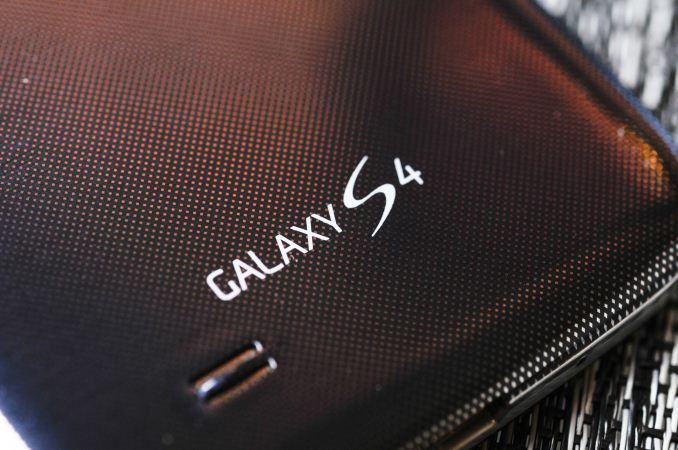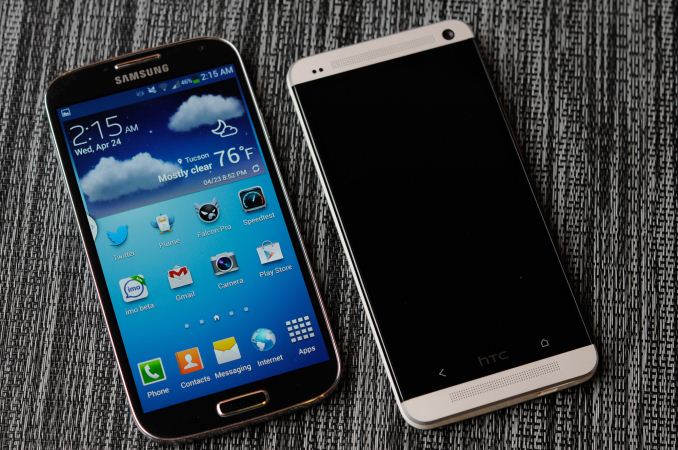Samsung Galaxy S 4 Review - Part 1
by Brian Klug on April 24, 2013 12:01 AM ESTFinal Words
Samsung has done a tremendous job creating a global following not only for its brand, but also for its software. In studying Samsung and its devices it becomes quite clear that although many enthusiasts yearn for pure, unadulterated Android, there are seemingly big pockets of the market who have grown used to (and maybe even desire?) Samsung's TouchWiz user experience. It really is a very clever strategy on Samsung's part. If you deliver products that your users appreciate, and deliver a uniquely different user interface at the same time, you begin to create an appreciation for that user interface as well. All of this flies in the face of what we as reviewers normally seem to prefer, but Samsung's success is proof of the fact that not everyone absolutely detests OEM customized Android.
Samsung's existing user base is likely the easiest to talk to about the Galaxy S 4. Compared to any previous Galaxy S device, the SGS4 is a clear step forward in all of the right areas. The display is higher resolution, the SoC is significantly faster, there's better WiFi (and connectivity depending on what generation of Galaxy S you're talking about) and obviously the Galaxy S 4 runs the absolute latest version of Android. Even on the camera side, Samsung has improved imaging performance over the Galaxy S 3 this generation thanks to its use of a wider aperture lens system. If you're a happy owner of a Samsung Galaxy S/S2/S3, you'll likely be a happy owner of a Galaxy S 4.
It's when you compare the Galaxy S 4 to its chief technical competitor, the HTC One, that the discussion becomes more complicated. HTC and Samsung take very different approaches to nearly every aspect of their flagship smartphones. Whether it's display (LCD vs. Super AMOLED), camera (low light vs. well lit performance), or software (subtle Sense 5 or feature filled TouchWiz), you couldn't pick two more different players in the Android space. So which is better?
It really depends on what you value more. The One's camera delivers better low light performance, while the Galaxy S 4's camera delivers better performance in well lit (e.g. outdoor) scenarios. The One's software customizations are definitely more subtle and out of your way, while Samsung's approach is much more feature overload and in your face. It's difficult to say for sure given our Sprint review unit, but HTC likely gets the slight edge in battery life based on our results here today (although these two devices can be close competitors depending on the workload). Samsung does integrate the faster SoC, despite both the Galaxy S 4 and HTC One shipping the same Snapdragon 600 platform. Samsung and HTC remain on opposite sides of the removable battery/microSD fence, if those two things matter to you then Samsung is the obvious choice. Finally there's a question of how much you value/desire an all-metal smartphone. For some, Samsung's choice in materials is going to continue to be a very big issue.
At the end of the day, the Galaxy S 4 is an evolution of the Galaxy S 3 in pretty much all of the areas you'd expect it to be. Whether or not that's what you wanted in a new Android smartphone is going to vary from one person to the next. The good news is that you at least have a choice.












335 Comments
View All Comments
krumme - Wednesday, April 24, 2013 - link
Comparing at 200 nits, is fine, but at that brightness you actually get a more contrasty picture of Oled because of the darkness. For all practical usage - depending on your eyes - you can turn brightness relatively more down on the Oled.You might note that the color accuracy of the S4 is far better than the One. Thats not to mention the contrast. Ofcourse it lacks the brightness. But the presentation here is one sided.
If you find yourself at bars at night or shooting food at the restaurant go for the One camera. But before you do, you might want to compare the pictures plenty available on the net on fx. gsmarena or phonearena
UpSpin - Wednesday, April 24, 2013 - link
If the surrounding is bright, you need a bright display, which OLED struggles at, even with a better contrast, which gets more and more negligible the brighter your surrounding is. At night however you really see the difference between the true black OLED and greyish LCD.I don't know how to properly interpret the color charts, so I judge by the impression of the author which favors the HTC One display (see the HTC One review and this review 'Admittedly this mode does tighten things up a bit, but it still isn't perfect and I'd still like to see Samsung do something to reign this in at some point. ') and the numbers in the article:
HTC One vs. SGS4
Grayscale 200nits Avg dE2000: 5.391 vs. 7.511
CCT Avg (K): 8118 vs. 7020
Saturation Sweep Avg dE2000: 3.365 vs. 7.823
GMB ColorChecker Avg dE2000: 4.656 vs. 7.440
The color charts seem to look better for the SGS4, the 'Total gamma' and greyscale charts however disastrous.
krumme - Wednesday, April 24, 2013 - link
For practical usage i agree the brightness for most people can be an issue in sunlight. We just have to remember there is much more at play here than just brightness.But at the same way using a phone in bright surroundings favor the saturation of Oled.
I never understand the standard setting on the S2 or S3. It gave stupid colors imho (and the sharpness wasnt there either imho compared to LCD competition). But if you chose fx. natural on the S3 i think you are pretty much where the colors is okey for everything personal. Its the grey scale that suffers - the shaddow details is very bad imho. Apparently thats still an issue on the S4.
But the basic problem about reviewing the display this way, is that we get zero numbers for the all important dynamics of the picture. And its just so obvious for the eye that oled got something here.
nerd1 - Wednesday, April 24, 2013 - link
What matters is the perceived CONTRAST, not the brightness itself.Practically AMOLED has better contrast overall, which helps sunlight reading a bit although bit dimmer.
sigmatau - Thursday, April 25, 2013 - link
I feel you are just guessing based on what you see on paper. My Samsung AMOLED plus screen is useless in the sun with full brightness. Most reviewers said that the HTC's screen kills the S4's screen. I am thinking of buying an HTC One and trying it out for a day or two before deciding. I really do like the blacks on OLED screens.krumme - Thursday, April 25, 2013 - link
Nonsense. Plenty sites gives the edge to Samsung. But i guess most just turn the autopilot on. Something happened since your amoled screen. Sunlight legibility is a personal matter, because reflection also plays a big role.sigmatau - Thursday, April 25, 2013 - link
Bull shit. My OLED screen is the best with Nokia's superior filter and still is terrible in the sunlight. I have to find shade just to use the phone. And remember, mine is a plus OLED screen, these on the S3 and S4 are not, which makes them worse.UpSpin - Thursday, April 25, 2013 - link
The glass reflects a lot of the sunlight.The display must be brighter than the reflections to remain readable. That's independent of contrast in the first place. So either reduce the reflections (AR coating, Nokia polarisation) or increase the brightness. The contrast isn't important in the first place here. OLEDs have a lower brightness than LCD, thus, and just as every review talking about outdoor use agrees with, LCD is much better readable outdoors.If you have a very dark display with an impressive contrast you won't see anything in sunlight, because the reflections are much brighter than the content on your display.
Special outdoor display also don't just have RGB, but RGBW, just to make it even brighter for outdoor use.
krumme - Thursday, April 25, 2013 - link
Go here to see an measurement of sunlight contrast ratio:http://www.gsmarena.com/samsung_galaxy_s4-review-9...
S4 is quite good, and if i recall about the same order as One.
ssj3gohan - Wednesday, April 24, 2013 - link
Wait a sec... you have an LTE/HSPA synthesizer, right? Why don't you try out battery life with that, so you're guaranteed to have equal signal strength, bandwidth and latency throughout the tests instead of having to rely on different vendors, signal quality and concurrency.